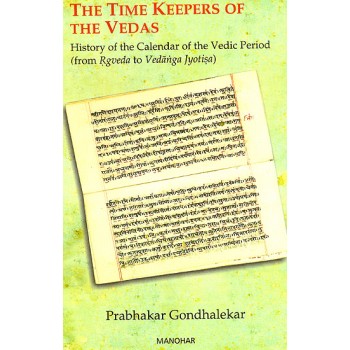The Time Keepers Of The Vedas (History Of The Calendar Of The Vedic Period, From Rgveda To Vedanga Jyotisa)
| Price: | Rs.895.00 |
Detail Of The Time Keepers Of The Vedas (History Of The Calendar Of The Vedic Period, From Rgveda To Vedanga Jyotisa)
| ISBN | 9788173049699 |
| Pages | 299 |
| Language: | English |
| Product Code: | 1 |
| Size(in cm): | 9.0 inch x 6.5 inch cm |
| Weight(in grams): | 894(approx) |
Description:
About the Book
There are three clocks of nature; the diurnal clock that measures the days, the lunar clock that measures the months and the solar clock that measures the seasons. The calendar is man’s frustrated attempt(s) to synchronize these three clocks. Different cultures have attempted, in different ways, to synchronize these clocks or formulate a stable calendar.
The calendar of the Vedic period has confounded historians of science for over hundred years. The foundational elements of a calendar (season, year, month and day) are noted in Rgveda Samhita, the oldest surviving text in Sanskrit. However, the nineteenth and twentieth-century scholars failed to identify in the Vedic texts, any accurate procedure to synchronize the three clocks of nature. The consensus has been that the Vedic ritualists had only the crudest of calendar and they had failed to adequately synchronize the three clocks of nature.
This book shows that this conclusion is false. The Vaidikas had developed unique and accurate schemes to synchronize these clocks and had formulated a stable calendar. Vedañga Jyotisa is a continuation of the development of calendar science of the Vedic texts. Vedanga Jyotisa expresses the calendar concepts of the Vedic texts in mathematical form and introduces algorithms to compute calendar parameters significant to the Vedic ritualists. It also describes a (partial) ecliptic coordinate system to define the position of the moon and the sun. This coordinate system is not irregular divisions of the naksatras, as has been assumed up to now. With this coordinate system the algorithms of Vedañga Jyotia can be interpreted unambiguously, without it they are meaningless.
About the Author
Prabhakar Gondhalekar graduated in physics from imperial College, London and obtained a Ph.D from University of London. He is an astrophysicist with major research interest in the interstellar medium and active galactic nuclei. He was formerly head of the Space Astronomy Group at the Rutherford Apleton Laboratory. he studied Sanskrit at the oriental Institute, Oxford University. His interest is in the study and analysis of Vedic texts
Reviews (0)
There are no reviews for this product.
Write a review
Your Name:Your Review:
Note: HTML is not translated!
Rating: Bad Good
Enter the code in the box below:



 |
| 